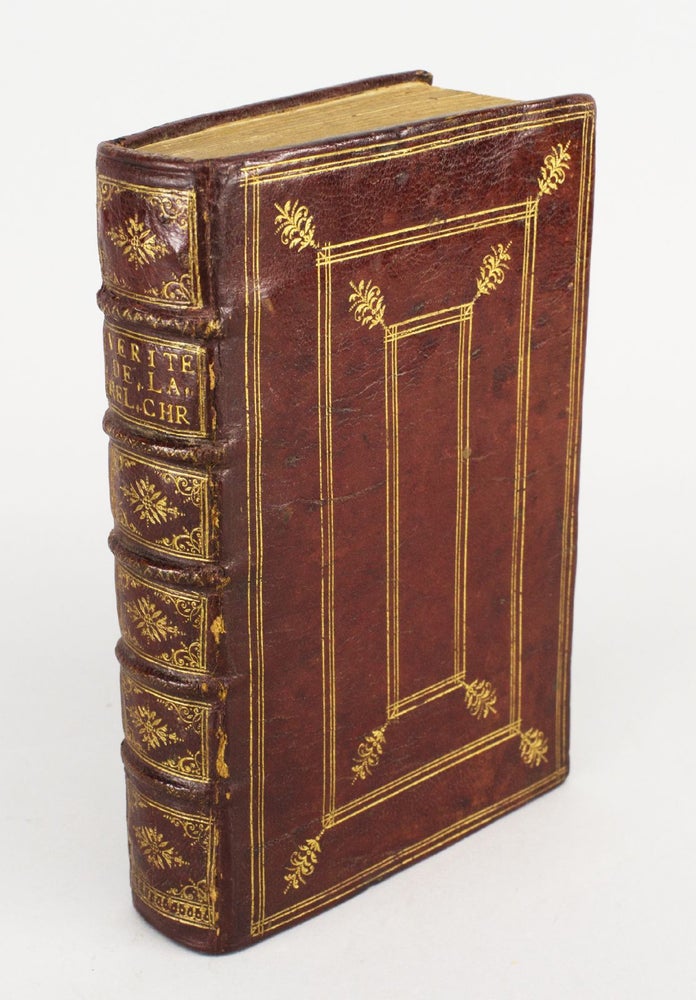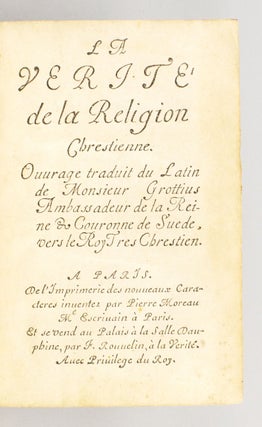LA VERITE DE LA RELIGION CHRESTIENNE.
(Paris: De l'Imprimerie de nouveaux caracteres . . . par Pierre Moreau, [8 Juin, 1644]). 175 x 113 mm. (6 7/8 x 4 1/2"). 8 p.l., 541 pp., [1] leaf (privilege). Translated by François Eudes de Mezeray. First Edition of this Translation.
Attractive contemporary burgundy morocco, gilt, covers with three French fillet frames, the two inner frames with oblique fleurons at corners, raised bands, spine gilt in compartments with central fleurons, curling cornerpieces, gilt titling, marbled pastedowns, all edges gilt. Updike I, 207-08. ◆Boards a little spotted, leather a bit crackled, light wear to joints, minor offsetting on endpapers from glue used for turn-ins, leaves a shade less than bright with occasional small rust spots, but an excellent copy nevertheless, the text clean and fresh, and the solid, very pleasing binding with nothing approaching a condition issue.
This edition of Grotius' famous treatise on the validity of Christianity features a lovely period binding and a charming cursive type invented by printer, engraver, and master calligrapher Pierre Moreau. According to Updike, the type is unusual in that it "really appears to be writing--a careful and lively copy of the agreeable calligraphy of the period. The ornaments used with it are reproductions of writing-masters' scrolls and whimsical figures, and here and there heavy flourishes are added to produce a further illusion of penmanship." Moreau (ca. 1599-1648) produced three very pretty engraved devotional books before developing a moveable type that could produce a calligraphic effect. He debuted his new fonts in 1643, calling his printing house the "Printer of new characters," and produced 30 books with them in the five years before his death. The binding here is also finely wrought, being made with high quality materials and adroitly decorated. In many ways a latter-day Erasmus, the renowned jurist and man of letters Hugo Grotius (1583-1645) was one of the most learned men of his time, and his landmark publication "De Jure Bellis et Pacis" earned him the title of the founder of the modern science of the law of nature and nations. First printed, in Latin, in 1627, the present book, far and away the most popular of Grotius' works, is a treatise maintaining the truth of the Christian religion, as opposed to other religions, rather than a polemic in support of a particular variety of Christianity at the expense of another Christian sect. The piece reflects the author's attitude toward the great schism: he dedicated himself to reconciling Catholic and Protestant by emphasizing a common piety, an approach for which he was obviously made to suffer greatly. Works printed in Moreau's cursive type are uncommonly seen in the marketplace, and they are especially rare in fine contemporary bindings like the present one. (ST13028)
Price: $6,500.00


